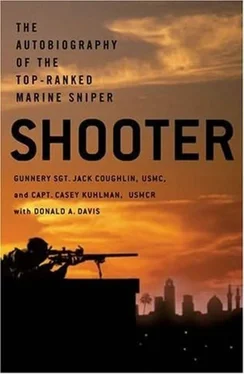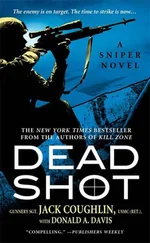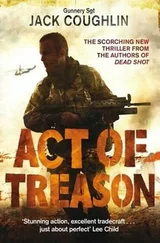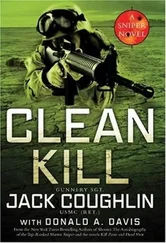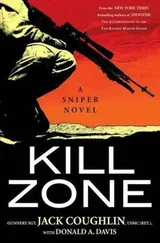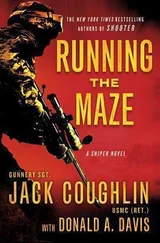After my unauthorized tour, we went to work on insertion tactics to determine ways to get into the fighting zone, and then I took the boys inside the city to set up hides. In a real combat situation, we would have gotten into position early, so why not do the same in a war game? And why not do it in secret? We would never tell the enemy what we were doing. We established excellent rooftop positions, found spots deep in the shadows inside the buildings, arranged some other sneaky hides, and made ourselves at home.
Then we practiced moving quickly and aggressively from one hide to the next, taking advantage of the cluttered urban terrain. I had no intention of being a sitting target for a bunch of tanks and artillery or being overrun by infantry troops. In this miniwar, we would be fine just sneaking from one position of cover to another, but I could not help thinking of the future. When a real fight came along, we would need solid, hardened vehicles to safely cover long, exposed distances, and I wanted other Marines around to protect us with additional firepower, so we could concentrate on dominating the battle. Moving from place to place alone or with just another sniper would leave us much too vulnerable. Without good protection, survivability became the ultimate issue, and a dead sniper is useless.
For ProMet, though, our boots would serve us fine, and by the time the other side got to where we had been hiding, we should already be gone. Let them try to find us. Urban sniper movement can be a bitch to solve, and combat in tight quarters can be a terrifying business. Streets and alleys are ready-made kill zones, and closely packed buildings are obstacles for troops and vehicles alike. We could pop somebody from a rooftop and two minutes later be shooting from behind a bunch of street junk, staying on the move.
Instead of real bullets, everyone would be firing lasers and would be festooned with MILES gear, electronic devices that simulate shots from the various weapons. A hit triggers buzzers on the web gear and helmets of the “enemy” soldiers, and a person who is hit immediately lies down and pretends to be dead. He cannot give advice, talk on the radio, or participate in the fight in any way. All he can do is lie on his ass and wonder what hit him.
Our targets, I reminded the boys, were not the grunts in front. We wanted to reach over their heads and touch more important targets. Get the officers first, then any enemy snipers who might threaten us, then go after their forward observers and senior sergeants. In other words, decapitate the leadership. Next would be the crew-served weapons like big machine guns and rocket launchers. In a real war, we would also shoot the radios themselves. Put a bullet in the operator, and someone else can pick up the handset and make a call. Put the radio out of commission, and the operator makes no difference whatsoever. There was a whole long list after that, but the important thing for them to remember was to shoot priority targets that could make a difference, then get away from the advancing troops and do it again.
By the time I finished my final walk-through, visualizing the coming battle, and returned to my room, I was satisfied that we indeed had found something useful to do. I gathered the lads and gave them a final talking to. We all knew exactly what was expected-nothing less than changing the way some of the most influential people in the Marine Corps thought about the way snipers could be used in combat.
Dawn on the day the exercise began brought more cold, wet weather, and we were hidden in our positions, waiting, hours ahead of time. The attack force gathered outside of town, and after a nice breakfast, the USFOR leaders came out to play. Officers from foreign armies had been invited to observe ProMet and see how Marines could take a city. There were final briefings, equipment checks, and a lot of engines revving to life. The noise was incredible as they moved into position. Stealth was never a factor for them, but it is everything to a sniper. That’s what the manual says, so it must be true.
The defending force was already positioned inside the city, but we snipers, unloved little bastards that we are, were operating independently. Our positions were marked on the map grid lines of the commanders, but those were going to be obsolete after the first shot. I would not be playing fair today, because I believe it is sometimes better to beg forgiveness than to ask permission. We were in our hides long before the first attacking unit of Marines crossed the starting line. Welcome to my world.
It didn’t take long. I was in a prone position, rifle at my shoulder, far back in the shadows of a room, with a table and some other junk stacked in front of me, invisible to anyone looking in with powerful binos. Thanks to having done this sort of thing for much of my life, I had hardly moved since wiggling into position hours earlier and clearly heard the noise of the advancing units. Jesus, they might as well have broadcast “Hey! Here we come!” on our radios.
A helmet peeked around a corner, and the game commenced. I let their lead squad go and held my position until one of my favorite targets came into view, a platoon commander talking on his radio. Zap! Zap! Zap! We laser-shot the lieutenant and his radio operator, then took down a squad leader, too, and the whole attack ground to a halt. Miss Lyudmila Pavlichenko would have been proud.
That’s when I kicked in the second half of my plan. The book says that a sniper’s progress must be careful and slow, measured in feet and often in mere inches. Screw that. We hauled ass. By the time the attacking force figured out the source of the original shots, my boys were gone, and the USFOR wasted a lot of time sneaking up on empty houses.
Movement. Mobility. Aggressiveness. We shifted from hide to hide, from one place of concealment to another, and poured beeping electronic death on our fellow Marines. We made a flank attack. We snuck into their rear area and shot anybody who even looked like an officer. Machine gunners atop Humvees were nice targets. And by increasing the pressure in one spot, we herded the ground-pounders into other kill zones, where we could shoot more of them and move on. It got silly after a while.
By afternoon, the exercise was in chaos, and the senior planners were, shall we say, pissed off. A lot of time and money and effort had gone into running this show, and my boys and I were making a mockery of it. They said we couldn’t survive in an urban environment, but we seemed to be surviving just fine. They couldn’t find us, much less stop us.
One young platoon commander in particular got the message. Second Lieutenant Casey Kuhlman, a linebacker-sized engineering graduate from the University of Illinois, was only three months out of the Infantry Officer’s Course and had been doing pretty well winning his spurs. After participating in Steel Knight, a thunderous live-fire desert training exercise, he had found the ProMet drills completely different and somewhat quieter. I had him in my scope from the moment he rolled into town atop a tracked vehicle, and I watched him dismount and walk cautiously forward. He was doing everything right, leapfrogging his boys forward with good cover, establishing bases of fire, and coordinating with the units on his flanks. Then I shot him; his buzzers erupted, and he had to lie down. The radio operator right behind him was the next to go, and then the platoon stopped, because there was nobody to command them and they couldn’t communicate. We turned our fire on the heavy weapons people next and debilitated the platoon’s firepower. I leaned from the window of my hide for a moment and waved broadly to Casey so he would know exactly who nailed him, then ran for a new location.
Casey lay there for a while and considered what had happened. His people were adding nothing to this make-believe war, since several more of them had been tagged and had come to a beeping stop. With nothing else to do, he made a note to look into the situation when it came time to debrief. He learned fast and would later become my guardian angel when we started running sniper strike teams for real in Iraq. I never apologized for shooting him in ProMet.
Читать дальше
